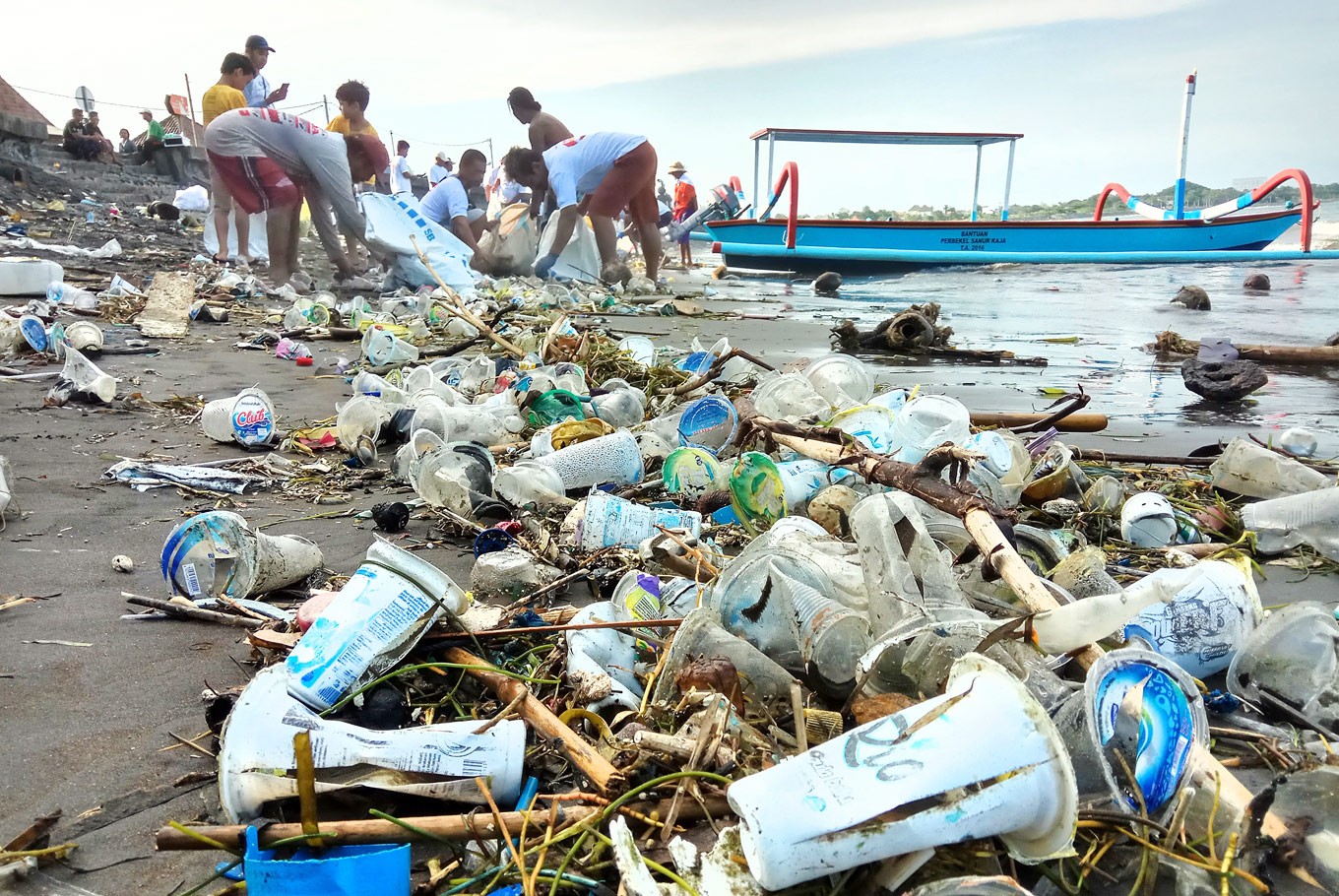Popular Reads
Top Results
Can't find what you're looking for?
View all search resultsPopular Reads
Top Results
Can't find what you're looking for?
View all search resultsTransforming Bali into a clean and green island
By instilling youthful love for a clean environment and commitment to achieving it, they are helping restore the beloved Balinese harmony between nature and humanity.
Change text size
Gift Premium Articles
to Anyone
T
he word “transformers” originally meant people that implement significant change. But in 1984 the Japanese company Taraka changed its meaning for millions of little boys, with its toy cars that could be turned into good guys and bad guys, and the good guys always would always win.
David Dkam or Dewa Mahardika is a Balinese school teacher who is creating a new definition of transformers that blends the old meaning and the popular hero meaning. The bad guys are plastic waste and those who do not care for the environment. Plastic waste is a huge problem in Bali as shown in the fantastic new documentary now showing in theatres in Bali, Pulau Plastik, perhaps translated as Island of Plastic.
The good guys are The Transformers (check them on Facebook), school children committed transform the environment, heroes of managing plastic waste. They wear gloves and masks, just a little like ninjas, to clean rivers of plastic so they supply clean water downstream. They encourage the poor and elderly to participate. They work with schools and villages to develop Trash Banks. They collaborate with whoever they can to achieve their purpose.
And their purpose is to transform mindsets and culture. By instilling youthful love for a clean environment and commitment to achieving it, they are helping restore the beloved Balinese harmony between nature and humanity.
On Earth Day (April 22), David organized a celebration of cleaning the environment. People in villages across Bangli regency collected plastic from gutters, fields and rivers, and brought them to the celebration. There were prizes of chickens and shoes to those who collected most plastic, and a water dispenser for the village that collected the most. Participants washed the plastic and sold it to a trash bank, with newcomers opening accounts. And all participants received eggs.
David gave a speech. He said that they were doing their part of the governor’s 22-point Nangun Sat Kerthi Loka Bali policy, for “maintaining sanctity and harmony with nature to create a prosperous Bali”. Point 21 of this policy is “to develop a Balinese way of life that is orderly, and an environment that is green, beautiful and clean.”
The Transformers are not the only ones in the Bali community working on plastic waste and cleaning the environment. There are dozens of Plastic Banks now, river and beach clean-up days, supported by many local organizations. I have not lived anywhere where civil society so prizes a clean environment, and the government seems to care so little. In terms of Nangun Sat Kerthi Loka Bali civil society effort is just a part of point 21.
The regent of Bangli gives his support to The Transformers. But his local government’s environmental agency, like most local government agencies in most regions of Indonesia are not organized for outcomes. They are organized by functions in accordance with the law on local government. Thus, they have a function to management trash, not to assure the region is clean green and beautiful. The Public Works Ministry further divides trash management into urban trash collection and waste reduction efforts.
A minimum service standard is set for urban trash collection; they must collect trash from at least 70 percent of the population. Not 70 percent of the markets or shops or factories, but 70 percent of the population. This is not good enough for Bali. Bali needs standards to make Bali clean and green and beautiful.
A second minimum service standard is for trash reduction, reuse and recycling. And here is where civil society plays the major role, with the local government providing some support. The aim of civil society is to help create a clean, green and beautiful environment, but the government’s aim is to reduce in the waste taken to the tip. This also is not good enough for Bali.
In Bangli, this agency is not responsible for trash collection from markets. They manage their own waste, without reduction, reuse and recycling.
Part of the problem is defining local government by functions instead of responsibilities. By defining by function, there is trash collection, there is no clear public service responsibility to see that no trash is left behind.
I believe the origin of the clean and green movement in Indonesia is Surabaya, an alliance between then mayor Tri Rismaharini, Wings and Jawa Pos. Risma is now social affairs minister. And now Bali has the twin problems of plastic waste and need for social welfare in this economic downturn. What an opportunity!
Never has Bali had so many people who could clean up and could use the cash if only government would see the social welfare advantage of making Bali really clean and green.
Please, government, sponsor The Transformers and other volunteer groups. And employ as many as you can to create a genuine Bali clean and green and beautiful!
Wings still supports a clean environment with corporate social responsibility. What an opportunity for it to turn its attention to its own products that produce waste! Risma engaged them in cleaning up Surabaya 20 years ago. Now please, government, engage them to lead an initiative to change packaging so that they are responsibility for the packaging after use.
David Dkam and The Transformers, and the host of others in Bali who have a passion for Bali clean and green and beautiful, not as point 21 but as total commitment, are willing to help.
***
The writer is a professional associate of the Institute for Governance and Policy Analysis at the University of Canberra.










